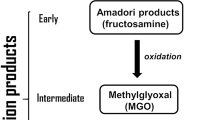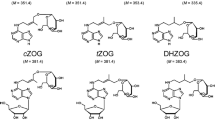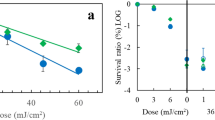Abstract
IT has been shown by Mitchell and Simon-Reuss1–3 that some phosphorylated methyl-naphthohydroquinones are radiosensitizers of radiation-induced mitotic inhibition in chick fibroblast tissue. It seemed possible that these chemicals might be of value in the induction of mutations in plants as they afforded a means of modifying response to radiation. Accordingly, experiments were carried out to see if any of these compounds are radiosensitizers in plant tissues.
This is a preview of subscription content, access via your institution
Access options
Subscribe to this journal
Receive 51 print issues and online access
$199.00 per year
only $3.90 per issue
Buy this article
- Purchase on Springer Link
- Instant access to full article PDF
Prices may be subject to local taxes which are calculated during checkout
Similar content being viewed by others
References
Mitchell, J. S., and Simon-Reuss, I., Brit. J. Cancer, 6, 305 (1952).
Mitchell, J. S., and Simon-Reuss, I., Brit. J. Cancer, 6, 317 (1952).
Mitchell, J. S., Simon-Reuss, I., and King, E. A., paper read at the Seventh International Cancer Conference, London, 1958 (in the press).
Bora, K. C., Acta Radiologica, 47, 397 (1957).
Author information
Authors and Affiliations
Rights and permissions
About this article
Cite this article
McKELVIE, A. Effect of Phosphorylated Methyl-naphthohydroquinones on the Response to Radiation in Barley Roots. Nature 183, 1194–1195 (1959). https://doi.org/10.1038/1831194a0
Issue Date:
DOI: https://doi.org/10.1038/1831194a0
This article is cited by
Comments
By submitting a comment you agree to abide by our Terms and Community Guidelines. If you find something abusive or that does not comply with our terms or guidelines please flag it as inappropriate.



